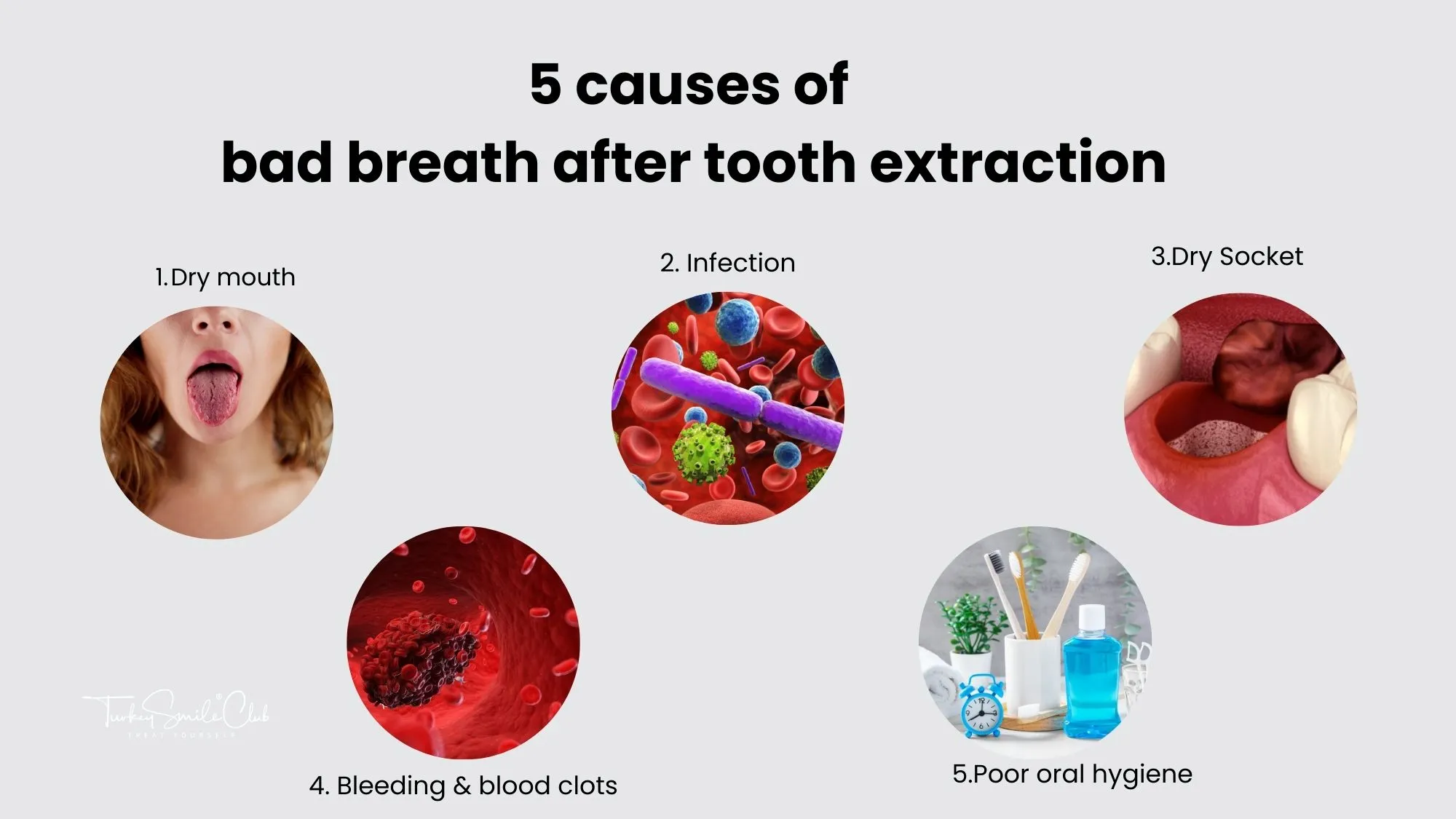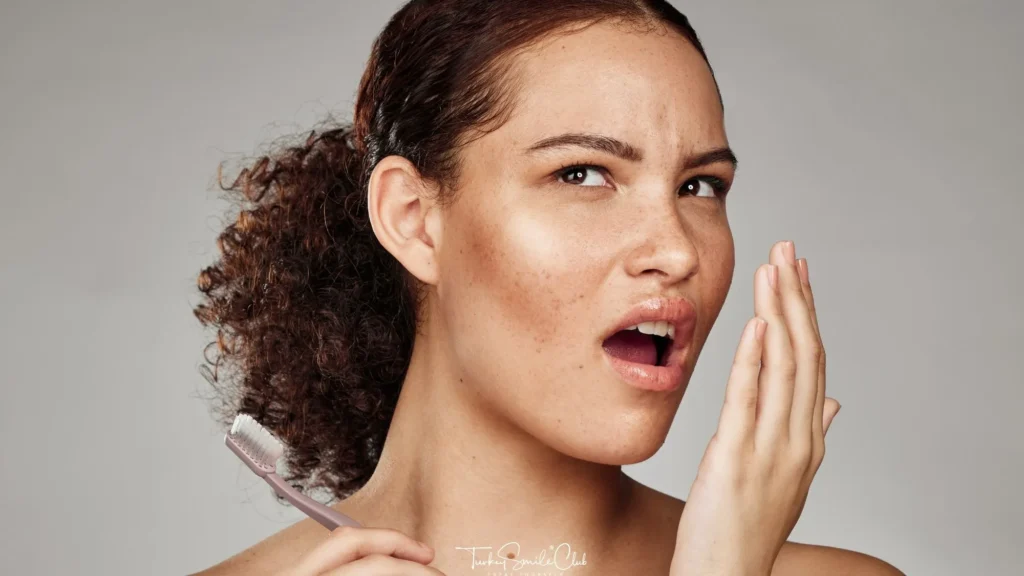
Bad breath after tooth extraction: Causes, precautions, treatment
Have you had a tooth extraction and have bad breath? It is normal to be worried. In this blog post, ‘Bad Breath After Tooth Extraction,’ we will talk about the causes, prevention, treatment, and when you should visit a dentist.
5 Causes of bad breath after tooth extraction
Unless you also experience symptoms such as pain, bleeding, dry socket, discharge, infection, or fever, bad breath after tooth extraction is probably not a serious problem.
1. Dry socket
Dry socket is the exposure of bones and nerves due to the failure of the blood clot to form at the site of tooth extraction (socket), its displacement, or premature dissolution. When dry socket occurs, the patient experiences severe pain, discharge, and pronounced bad breath. Dry socket is usually seen 3-5 days after tooth extraction.
When you encounter symptoms of dry socket, you should definitely be treated urgently by your dentist. This is not a dental problem that can go away on its own or can be treated at home. Your dentist cleans the socket and ensures that the wound closes quickly. At this stage, be sure to follow your dentist’s instructions.
In order to prevent dry socket, it is necessary to stop smoking, avoid alcoholic beverages, not spit or rinse violently, and not treat the wound aggressively.

2. Poor Oral Hygiene
It is a bit frightening to touch tooth extraction site while the wound is still fresh. Patients hesitate to use a toothbrush for fear of damaging the wound. Oral health is not given due importance. However, due to food residues and bacteria that form over time, tooth extraction area causes bad breath and infection development. In addition, food crumbs remaining in tooth extraction area are broken down by bacteria and cause bad breath (halitosis). Therefore, patients should continue to take care of their general oral health and dental care. It is only necessary to be a little more sensitive to the tooth extraction area.
3. Bleeding & blood clots
Bleeding after tooth extraction is an expected condition. If you experience prolonged bleeding, consult your dentist. One of the reasons for bleeding after tooth extraction is the removal of the blood clot formed after tooth extraction.
As you know, the blood clot acts as a plug, prevents blood loss, and accelerates healing. When a blood clot forms again, the bleeding stops.
Another reason is smoking. Smoking delays wound healing and prevents blood clotting. It also makes the wound more susceptible to infection.
4. Dry mouth
Dry mouth is a condition in which the mouth does not secrete enough saliva. It is normal to experience temporary dry mouth (xerostomia) due to some side effects during tooth extraction. The most important task of saliva in the mouth is to clean bad bacteria in the mouth. Therefore, it prevents bad breath. In case of dry mouth, the bacteria in tooth extraction area have the opportunity to multiply, and this causes bad breath and infection development.
To cope with dry mouth, you should drink water at frequent intervals. At the same time, using sugar-free pastilles also increases saliva production.
5. Bacterial infections
In our body, there are bacteria that are beneficial for us as well as harmful bacteria. The wound that naturally occurs as a result of tooth extraction is a suitable area for the development of harmful bacteria. If the teeth and the tooth extraction area are not cleaned, harmful bacteria multiply here and cause symptoms such as bad odour, discharge, swelling, pain, and redness.
As there is a risk of infection in all surgical procedures, tooth extraction also has this risk, albeit to a lesser extent. If you show signs of infection after tooth extraction, do not wait for it to go away on its own and seek treatment from a dentist.
How to prevent bad breath after teeth removal?
Here are 5 suggestions to prevent bad breath after tooth extraction:
- The first thing to do is to pay attention to your oral hygiene. You should gently brush your teeth with a soft-bristled toothbrush. We do not recommend the use of mouthwash for the first 24 hours after tooth extraction, but you can prevent bacteria formation and bad odour by using mouthwash afterwards. You can also gargle with warm salt water to heal your wound faster and prevent bad odour. Do not neglect to add tongue cleaning to your dental cleaning. Because your tongue carries food residue to the tooth extraction area.
- By drinking water frequently, you trigger saliva production and neutralise harmful bacteria. Drinking water protects against both bad odours and infection.
- The most important thing is to follow all the instructions of your dentist.
- You should stop harmful habits such as alcohol and smoking. These prevent plenty of oxygen from reaching the injured area, slowing healing and increasing the risk of infection.
- You should avoid hard, sticky, and crunchy foods. You should be careful to consume more soft foods.
How to deal with bad breath after tooth extraction?
If you pay attention to your general oral hygiene, bad breath after tooth extraction is largely prevented.
If the patient shows signs of dry socket or tooth infection, the patient should definitely see a dentist. The treatment to be applied in this case is generally antibiotics and painkillers. The application of this treatment by patients without consulting the dentist may cause different complications. Being conscious about this issue is important for your health.
F.A.Q.
How long does bad breath last after tooth extraction?
In general, you will not experience bad breath after tooth extraction after 1-2 days. You can contact your dentist for your continuing bad breath problem.
Why does my breath stink 3 days after tooth extraction?
Due to dry socket, you may experience a bad and distinct breath after 3 days. In addition, infection developing in the socket part also causes this.
Getting dental implant treatment in Turkey and having long-lasting teeth in a safe way is more affordable than in the UK. If you are planning to get dental implant treatment immediately after tooth extraction in Turkey, please contact us and visit our website.